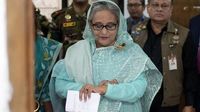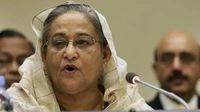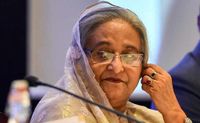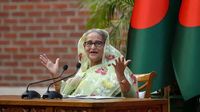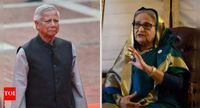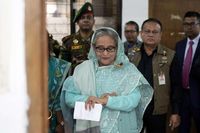In a dramatic escalation of political tensions in Bangladesh, former Prime Minister Sheikh Hasina has accused interim government chief Muhammad Yunus of conducting a violent campaign against her supporters, calling it a "killing spree" that targets members of her Awami League party and ordinary citizens. Speaking from exile in India, where she fled following her ouster during a nationwide student-led uprising on August 5, 2024, Hasina described Yunus as a usurer driven by a lust for power, stating, "Yunus has killed so many of our people."
Hasina's remarks, made during a live-streamed address to families of her party's slain leaders, drew parallels between Yunus's actions and the atrocities committed by Pakistani forces during the 1971 Liberation War. "Pakistan’s invading army shot people dead. This Yunus Bahini is hacking people to death, lathi-charging people to death. They are on a killing spree," she asserted.
In her address, Hasina lamented the absence of deceased Awami League leaders, police officers, and journalists from official lists of victims, calling it "the most unfortunate matter." She has previously accused Yunus of systematically dismantling investigative bodies and employing armed proxies to instill fear among the populace. "The killings were part of his meticulous conspiracy to throw me out of power," she stated, vowing to return and avenge the deaths of her supporters.
The Bangladeshi government has stated that repatriating Hasina is a top priority. "This government that usurped power has to go," she declared, emphasizing the unprecedented human rights violations under Yunus's leadership.
In a significant diplomatic encounter, Indian Prime Minister Narendra Modi met with Yunus on the sidelines of the BIMSTEC summit in Bangkok. During their 40-minute discussion, Modi raised concerns regarding the safety of minorities in Bangladesh, including Hindus, who have reportedly faced violence since Yunus took power. Yunus, in turn, inquired about Dhaka’s request for Hasina's extradition. Modi advised that "rhetoric that vitiates the environment is best avoided," reflecting India's cautious approach to the evolving situation.
In a separate virtual interaction, Hasina expressed her optimism about returning to power, stating, "Allah kept me alive for a reason" and assuring her supporters that justice would eventually be served for those who have suffered under Yunus's regime. She urged her party members to maintain a detailed database of Awami League activists, tracking injuries, deaths, and ongoing political activities. This database is intended to document the extent of violence against her supporters as well as damage to religious sites.
Hasina characterized Yunus as a figure who has exploited the people of Bangladesh, claiming he loaned out small amounts at high interest rates while living lavishly abroad. She emphasized the media clampdown in the country, stating that crimes such as rapes and murders go unreported for fear of retaliation against media outlets.
Reflecting on her personal losses, Hasina recalled the tragic day her entire family was killed, including her father, Sheikh Mujibur Rahman, the first President of Bangladesh. "I lost my father, mother, brother, everyone in one day," she recounted. "I know the pain of losing your own. Allah keeps protecting me, maybe he wants to get some good done through me. Those who have committed these crimes must be punished. This is my pledge."
As the political landscape in Bangladesh continues to shift, Hasina's fierce rhetoric against Yunus and the interim government underscores the deep divisions within the country. The Awami League, established in 1948, has been a pivotal force in Bangladesh’s struggle for independence and development, and Hasina's commitment to its legacy remains unyielding despite her current exile.
She has called Yunus's administration a "fascist" regime, accusing it of harsh actions against workers, teachers, and students. Her criticisms have resonated with many who view the current government as illegitimate and authoritarian. Despite the challenges, Hasina remains defiant, asserting that the Awami League will not be easily dismantled. "Their audacity astonishes me," she said, referring to calls for her party's ban. "We are not a parasite that emerged out of floodwaters."
As Bangladesh approaches elections later this year, the political climate remains fraught with tension and uncertainty. Hasina's supporters are rallying around her call for justice, while the interim government faces increasing scrutiny over its handling of dissent and human rights issues. The future of Bangladesh's democracy hangs in the balance as both sides prepare for what could be a contentious electoral battle.
In a recent statement, Yunus has dismissed reports of violence against minorities as exaggerated, claiming that "the bulk of them were fake news." This assertion has raised alarms internationally, with human rights organizations calling for thorough investigations into the reported abuses.
The situation in Bangladesh remains fluid, with both Hasina and Yunus gearing up for a political showdown. As the international community watches closely, the stakes have never been higher for the future of governance and human rights in the country.
